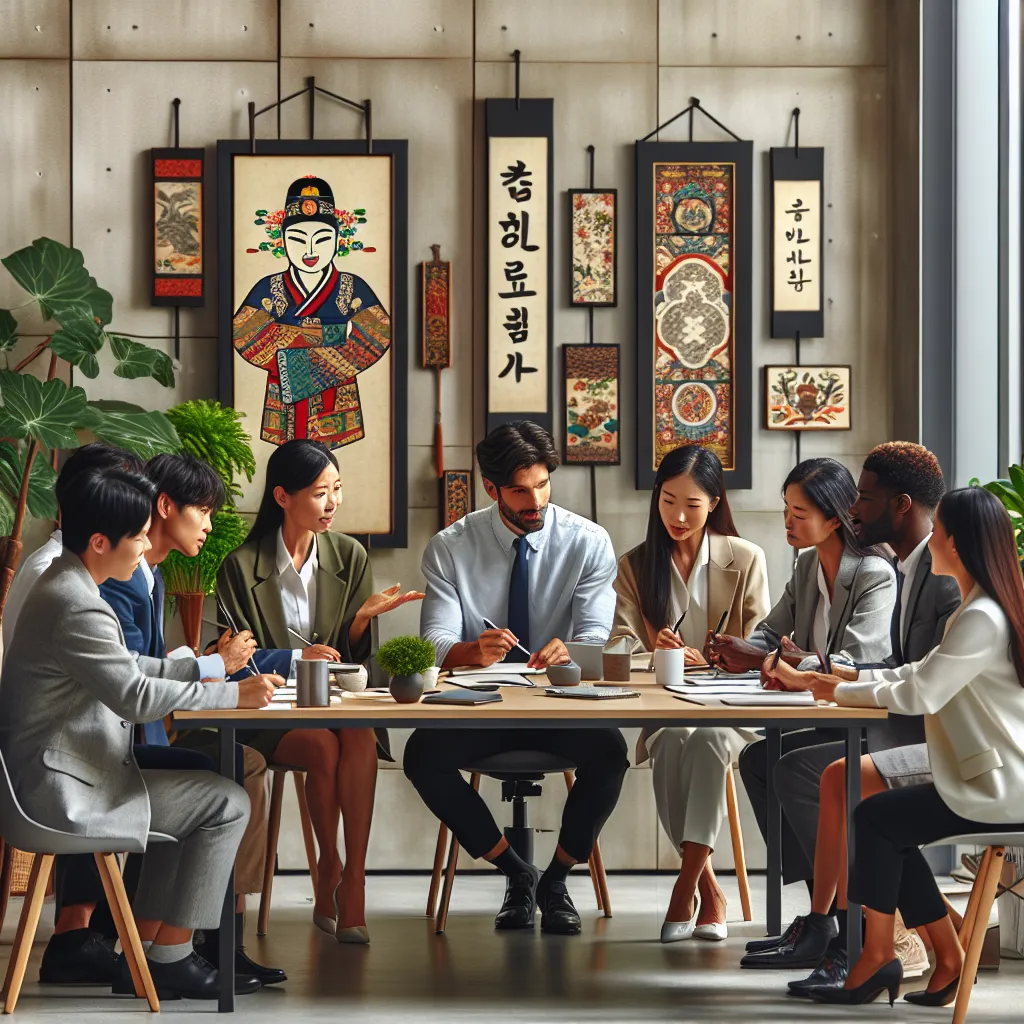In the fast-paced world of Korean business, understanding and respecting cultural differences is key to building successful relationships. Whether you’re a seasoned professional or just starting out, navigating the unique norms of Korean business can be both challenging and rewarding. Effective communication strategies, building strong relationships, and mastering etiquette in Korean business settings are all essential components for bridging cultural gaps and fostering mutual understanding. Let’s explore how we can embrace these differences and thrive in the dynamic landscape of Korean business together. Let’s dive in!

Understanding Cultural Norms in Korean Business
In the dynamic landscape of Korean business culture, understanding and respecting cultural norms play a crucial role in building successful relationships and partnerships. Korean business etiquette is deeply rooted in Confucian values, hierarchy, and respect for authority. For instance, age and seniority are highly valued in Korean society, and this is reflected in the business environment as well. It is common to address colleagues and business partners using their titles and adding respectful suffixes like “님 (nim)” to show deference.
The Importance of “Saving Face”
Furthermore, the concept of “saving face” is paramount in Korean culture. This means avoiding public embarrassment or confrontation, as it can lead to loss of reputation and credibility. Therefore, disagreements or criticisms are often communicated indirectly or in a more subtle manner to preserve harmony and relationships. Building trust and maintaining a harmonious atmosphere are essential in Korean business dealings.
Communication and Non-Verbal Cues
In terms of communication, Koreans tend to rely heavily on non-verbal cues and subtle gestures. Silence is often used as a tool to convey agreement or understanding, so it is important to pay attention to body language and facial expressions during meetings or negotiations. Additionally, the use of business cards is a common practice in Korea, and presenting and receiving them with both hands while bowing slightly demonstrates respect and courtesy.
Consensus-Building in Decision-Making
When it comes to decision-making, consensus-building is preferred in Korean business culture. Decisions are often made collectively after thorough discussions and consultations with all stakeholders. Patience and persistence are key virtues when navigating the intricate process of decision-making in Korean business settings.
In conclusion, embracing and adapting to the cultural norms of Korean business is essential for building strong and enduring relationships in the Korean market. By showing respect, understanding hierarchy, practicing effective communication, and valuing harmony, businesses can pave the way for successful collaborations and partnerships in this dynamic and vibrant business environment. 🌟🇰🇷🤝
Effective Communication Strategies
In the dynamic world of Korean business, effective communication plays a crucial role in bridging cultural differences and fostering successful collaborations. Understanding the nuances of Korean communication styles and etiquette can greatly enhance business relationships and pave the way for mutual understanding and respect. Let’s explore some key strategies to navigate the cultural landscape and communicate effectively in the Korean business context!
Active Listening
One of the fundamental pillars of effective communication is active listening. In Korean culture, listening attentively and showing genuine interest in what the other person is saying is highly valued. By actively listening to your Korean counterparts, you not only demonstrate respect but also gain valuable insights into their perspectives and priorities.
Politeness and Respect
Politeness and respect are paramount in Korean business interactions. Addressing colleagues and superiors with appropriate titles and using honorific language are essential aspects of Korean communication. Showing respect for hierarchy and age is key to building rapport and creating a positive impression in Korean business settings.
Non-verbal Communication
Non-verbal cues such as facial expressions, gestures, and body language carry significant meaning in Korean culture. Maintaining eye contact, nodding in agreement, and avoiding excessive hand gestures are important non-verbal communication strategies to convey attentiveness and understanding in Korean business meetings.
Building Trust
Trust is the foundation of successful business relationships in Korea. Building trust takes time and requires consistent communication, follow-through on commitments, and integrity in all interactions. By demonstrating reliability and honesty, you can earn the trust of your Korean counterparts and establish long-lasting partnerships.
Written Communication
In Korean business culture, written communication is highly formal and structured. When sending emails or written correspondence, it is important to use polite language, proper titles, and clear, concise messaging. Paying attention to detail and adhering to formalities can enhance the professionalism of your written communication.
Clarification and Feedback
In cross-cultural communication, misunderstandings can easily arise due to differences in language and cultural norms. To avoid miscommunication, it is important to seek clarification when in doubt and provide constructive feedback in a respectful manner. Open communication channels for feedback can help address any issues proactively and strengthen relationships.
By implementing these effective communication strategies, you can navigate the cultural nuances of Korean business with confidence and build strong connections with your Korean counterparts. Remember, effective communication is not just about words; it is about fostering understanding, respect, and trust in every interaction. Embrace the cultural differences as opportunities for growth and collaboration, and watch your business relationships flourish in the vibrant landscape of Korean business!
Building Strong Relationships
In the dynamic world of Korean business, building strong relationships is the key to success. Whether you are a seasoned entrepreneur or a newcomer to the Korean market, understanding and respecting cultural differences is essential in fostering meaningful connections. 🌟
The Concept of “Jeong” (정)
One crucial aspect to consider is the concept of “jeong” (정), which embodies deep emotional bonds and loyalty in Korean relationships. Establishing jeong with your Korean business partners can lead to long-lasting partnerships and mutual trust. 🤝
Hierarchical Nature of Korean Business Culture
Another important factor to keep in mind is the hierarchical nature of Korean business culture. Showing respect for seniority and maintaining a level of formality in your interactions can go a long way in building rapport with Korean colleagues. 🎓
Communication Style
Furthermore, communication style plays a significant role in relationship-building. Koreans value indirect communication and often rely on non-verbal cues to convey messages. Being attentive to these subtleties can help bridge any potential communication gaps and strengthen your connections. 💬
Social Activities
In addition to cultural nuances, taking the time to engage in social activities outside of the office can also enhance relationship-building efforts. Participating in group outings or sharing a meal with your Korean counterparts can create opportunities for bonding on a personal level. 🍜
Ultimately, by embracing cultural differences, showing genuine interest in your Korean business partners, and investing time in nurturing relationships, you can pave the way for successful collaborations and long-term partnerships in the Korean business landscape. 🚀
Remember, building strong relationships is not just about transactions; it’s about fostering connections that withstand the test of time and cultural boundaries. So, approach each interaction with an open mind, a willingness to learn, and a genuine desire to connect on a deeper level. Let the spirit of jeong guide your journey towards building strong and lasting relationships in Korean business. 💼
Navigating Etiquette in Korean Business Settings
Welcome to the world of Korean business etiquette! Understanding and respecting cultural differences is key to successful business interactions in Korea. Let’s dive into some important aspects to keep in mind when navigating Korean business settings.
Hierarchy Matters
Hierarchy plays a significant role in Korean business culture. It is essential to address people by their titles and use formal language, especially when communicating with senior members of the organization. Showing respect for seniority is highly valued in Korean business settings.
Building Relationships
Relationship-building is crucial in Korean business. Taking the time to get to know your Korean counterparts on a personal level, such as sharing a meal or engaging in small talk, can go a long way in establishing trust and rapport. Building strong relationships is often the foundation for successful business partnerships in Korea.
Punctuality
Punctuality is highly valued in Korean business culture. Arriving on time for meetings and appointments demonstrates respect for the other party’s time and shows your commitment to the business relationship. Being punctual is a simple yet effective way to make a positive impression in Korean business settings.
Exchanging Business Cards
When exchanging business cards in Korea, remember to do so with both hands as a sign of respect. Take the time to carefully examine the card you receive before putting it away. This gesture shows that you value the person you are interacting with and the information they have shared.
Communication Style
Koreans tend to value indirect communication and may use non-verbal cues to express agreement or disagreement. Pay attention to subtle cues such as facial expressions and body language during meetings. Additionally, maintaining a calm and composed demeanor, even in challenging situations, is important in Korean business culture.
Business Dinners
Business dinners are common in Korean business culture and are an opportunity to strengthen relationships outside of the office. Remember to wait for the eldest or most senior person to start eating before you begin. It is also polite to pour drinks for others before filling your own glass.
Gift Giving
Gift giving is a common practice in Korean business settings. When presenting a gift, use both hands or offer it with your right hand supported by your left forearm. Avoid wrapping gifts in white, as it is a color associated with funerals in Korean culture.
By understanding and respecting these cultural nuances, you can navigate Korean business settings with confidence and build strong relationships that will contribute to your success in the Korean market. Remember, embracing cultural differences is not only respectful but also a strategic advantage in the world of business!
Let’s continue to learn and grow together in our cross-cultural business endeavors! 🌏✨
In conclusion, navigating cultural differences in Korean business requires a deep understanding of cultural norms, effective communication strategies, and the ability to build strong relationships. By respecting etiquette in Korean business settings, you can bridge the gap between different cultures and create successful partnerships. Remember, it’s not just about business transactions, but about fostering mutual respect and understanding. So, embrace the differences, adapt to the cultural nuances, and watch your business thrive in the Korean market!
